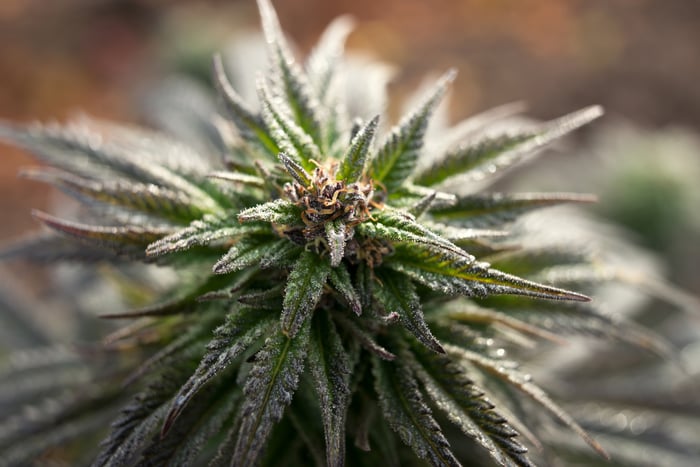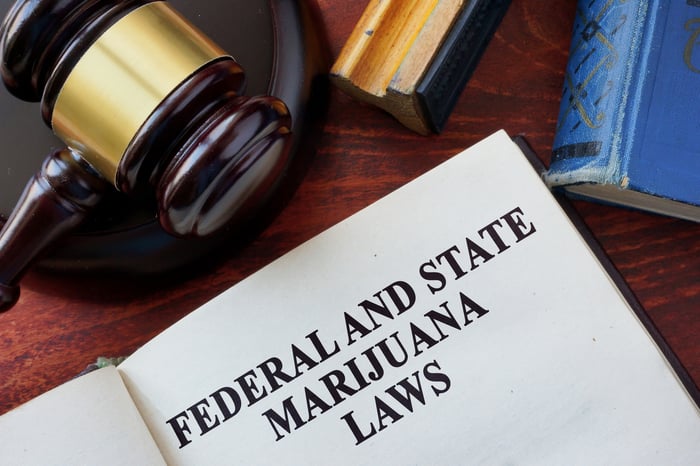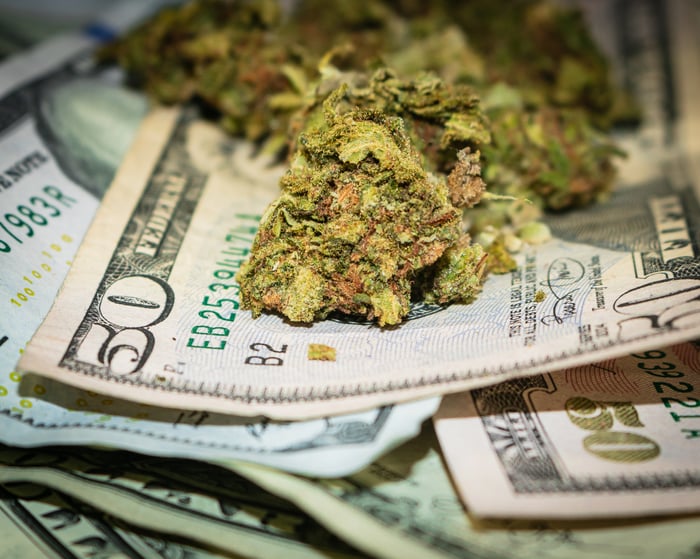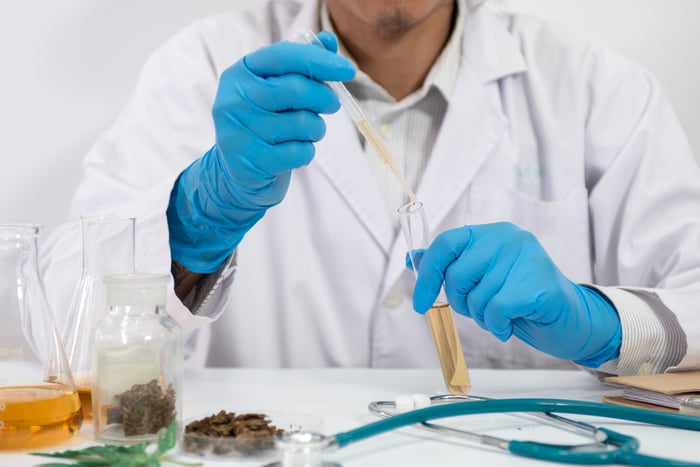Just in case you needed the reminder, Election Day is now just 44 days away. Amid the chaos that's been the coronavirus disease 2019 (COVID-19) pandemic, tens of millions of Americans around the country will soon head to their local voting booths or mail in their ballots to determine the path the U.S. will take going forward.
At stake this election are all 435 seats in the House of Representatives, a third of all Senate seats, and the big chair in the Oval Office.
Although anything could happen over the next 44 days, Democratic Party presidential nominee Joe Biden appears to have a firm lead in polling over incumbent Donald Trump for the presidency. There's little question that the president over the coming four years will have some serious challenges to tackle, including job growth, the coronavirus pandemic, and a struggling Social Security program.
But don't discount the role that marijuana could play in the upcoming election.

Image source: Getty Images.
Marijuana legalization could be a budding issue in the 2020 election
As of today, marijuana is legalized in some medical capacity in two-thirds of all U.S. states, with 11 of these states also allowing for the consumption and/or retail sale of weed. Even with cannabis remaining wholly illegal at the federal level (i.e. Schedule I drug), the U.S. is the unquestioned worldwide leader in annual pot revenue.
Furthermore, it's an issue that the American public has increasingly gotten behind. Following a roughly 25-year period (1975-2000) where national support for legalization stood pat at approximately 25%, national pollster Gallup finds that, for two consecutive years, 66% of polled Americans favor the nationwide legalization of the drug.
Marijuana is one of the fastest-growing industries within the U.S., and also one of the most prominent job creators. Remember, there's more to cannabis than just growing plants. Ancillary businesses involved in the marijuana supply chain, which includes marketing, branding, and financing, can also benefit from the industry's growth.
Joe Biden and marijuana: What you need to know
The point is, it pays to know where the leading presidential candidate, Joe Biden, stands on his views of cannabis. Here's an encompassing view of Biden's past, his proposed plan, and what the future might entail, if he's elected as president in November.

Joe Biden listening to former President Barack Obama. Image source: Official White House Photo by Pete Souza.
Joe Biden's past concerns cannabis enthusiasts
Although his views have evolved considerably over the past four decades, there weren't many lawmakers on Capitol Hill in the 1980s and 1990s that held a harsher view on drug offenses than Delaware Sen. Joe Biden.
For close to a two-decade span, the federal government waged a War on Drugs, with Biden as a key figure behind that battle. Specifically, between 1986 and 1990, Biden introduced a handful of bills that aimed to get tough on criminals that produced and distributed federally controlled substances -- and this included marijuana. Many of these bills called for harsher prison sentences for illicit drug offenders.
Pro-cannabis online publication Leafly points out that Biden's signature piece of legislation, the 1994 Violent Crime Control and Law Enforcement Act, has played a key role in skyrocketing incarceration rates for drug offenses in the U.S., and is responsible for the disproportionate imprisonment rates seen in lower-income and at-risk communities.
As recently as 2010, Biden was quoted in an ABC News interview as saying, "There's a difference between sending someone to jail for a few ounces [of marijuana] and legalizing it. The punishment should fit the crime. But I think legalization is a mistake. I still believe [marijuana] is a gateway drug."

Image source: Getty Images.
Here's Biden current proposal
However, Biden's stance on cannabis has evolved considerably since the late 1980s, and even since his comments in 2010. With the understanding that the American public wants to see restrictions eased on cannabis, Biden had this to say in January 2019:
I haven't always been right. I know we haven't always gotten things right [regarding incarcerations for marijuana offenses]; but I've always tried.
Furthermore, in May 2019, while speaking with prospective voters in New Hampshire, the former vice president noted, "Nobody should be in jail for smoking marijuana."
Andrew Bates, a spokesperson for the Biden campaign, laid out Biden's proposal to CNN in May 2019:
Vice President Biden does not believe anyone should be in jail simply for smoking or possessing marijuana. He supports decriminalizing marijuana and automatically expunging prior criminal records for marijuana possession, so those affected don't have to figure out how to petition for it or pay for a lawyer.
In other words, Biden's current proposal aims to undo some of the previous social inequities caused by the War on Drugs by removing use and possession as a criminal offense at the federal level. This would be done by moving marijuana from a Schedule I to Schedule II substance. For those curious, a Schedule I controlled substance is a drug with no adopted medical uses and a high propensity for abuse, whereas a Schedule II substance has accepted medical uses, but a high propensity for abuse and the need for oversight.
Take note that Biden's current proposal to decriminalize marijuana at the federal level is not the same as legalizing the drug. It would remain a controlled substance at the federal level.

Image source: Getty Images.
What does the future hold for marijuana under the Biden administration?
Now for the big question: If Biden wins in November, and his administration is able to implement a decriminalization and rescheduling of cannabis at the federal level, what does this mean for the marijuana industry?
On one hand, there's one plain-as-day positive to the former vice president's proposal: It would pave the way for cannabis banking reform. As things stand now, U.S. multistate operators (MSO) have struggled to access basic banking services, which range from loans and lines of credit to something as simple as a checking account. Banks and credit unions fear the potential for criminal and/or financial penalties that could be levied on them by providing basic financial services.
For a number of MSOs, the easiest workaround has been to turn to sale-leaseback agreements through the likes of Innovative Industrial Properties (IIPR 2.34%). Innovative Industrial Properties is a real estate investment trust (REIT) that buys then leases cannabis cultivation and processing sites for extended periods of time (usually 10 to 20 years). The company has somewhat regularly sold its common stock to raise capital, which it then uses to purchase cultivation and processing sites from MSOs. Innovative Industrial then immediately leases the property back to the seller. This arrangement allows MSOs to pocket much-needed cash, while netting IIP long-term tenants.
On the other hand, Biden's plan has the potential to create a logistical nightmare for the marijuana industry. You see, pot isn't deemed to have any medical benefits as a Schedule I substance. But as a Schedule II substance, it would have defined medical benefits. As such, it would fall under the watchful eye of the U.S. Food and Drug Administration (FDA).

Image source: Getty Images.
Biden's push to reschedule cannabis might be well-intentioned, but the move would allow the FDA to potentially impose strict regulations on the industry. For example, it could require that clinical trials be run to support claims that marijuana can be used to treat certain ailments, such as glaucoma or certain types of pain. The FDA would also be responsible for overseeing the manufacturing, packaging, and distribution of cannabis, and would likely impose strict requirements on producers in regards to tetrahydrocannabinol (THC) levels. THC is the psychoactive cannabinoid that gets users high.
In my view, Biden's proposal is a bit more of a headache than it is helpful. However, it's not going to be damning to the fast-growing U.S. pot industry. Even with MSOs having to operate potentially redundant facilities because interstate transport of weed isn't allowed, pot stocks are still primed for success in the biggest marijuana market in the world.
For instance, Green Thumb Industries (GTBIF 2.17%), which is one of my favorite MSOs in the U.S., is going to be prospering no matter who wins the presidency in November. Congressional sentiment has changed sufficiently to the point where individual states are running the show and the federal government has taken a back seat. This has allowed Green Thumb to pick up 96 dispensary licenses in 12 states, and should lead to one of the fastest growth rates in the industry over the next four years.
In short, cannabis stocks can still find greener pastures, even without legalization during a Biden presidency.




